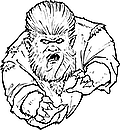• werewolf •
Pronunciation: wer-wUlf • Hear it!
Part of Speech: Noun
Meaning: A person who changes into a wolf under the full moon.
Notes: Belief in werewolves was widespread in the Middle Ages. (Notice the shift of F to V in the plural, werewolves.) Historically, were- has combined with other animal names: were-ass, were-jaguar, were-animal, etc. Otherwise, this word is a lexical orphan.
In Play:  Werewolves are the stuff of human imagination but remain contemporary because of recent horror movies: "The returning party reported killing six werewolves and eight vampires, but they had to outrun a pack of ghouls." People still write about them: "Rhoda Book sat down to write up the idea of pitting vampires against werewolves that was slowly evolving in her imagination."
Werewolves are the stuff of human imagination but remain contemporary because of recent horror movies: "The returning party reported killing six werewolves and eight vampires, but they had to outrun a pack of ghouls." People still write about them: "Rhoda Book sat down to write up the idea of pitting vampires against werewolves that was slowly evolving in her imagination."
Word History: Today's Good Word in Old English was werewulf "wolf-person", literally "man-wolf", made up of wer "man" + wulf "wolf". Similar formations are found in Dutch weerwolf, German Werwolf, and Swedish varulf. Wer also went into the making of Old English weor-old, literally "man-age" = "world". Today that word is world. In the ancient Persian calendar, the eighth month (October-November) was Varkazana, literally "(month of) men-wolves". Wer descended from PIE wiro- "man", source also of Sanskrit virah "man", Latin vir (whence virile), Lithuanian vyras, Irish fear, and Welsh gwr, all meaning "man". Wolf came through English's Germanic ancestors from PIE wlkwo- "wolf". Apparently the [k] reduced to [h] and eventually dropped out in Germanic languages, but it remained in Slavic as seen in Russian volk, Czech vlk, Polish wilk and Serbian vuk. (Susan Maynard thought that today's might be a topical Good Word as Halloween approaches.)
P.S. - Register for the Daily Good Word E-Mail! - You can get our daily Good Word sent directly to you via e-mail in either HTML or Text format. Go to our Registration Page to sign up today!




